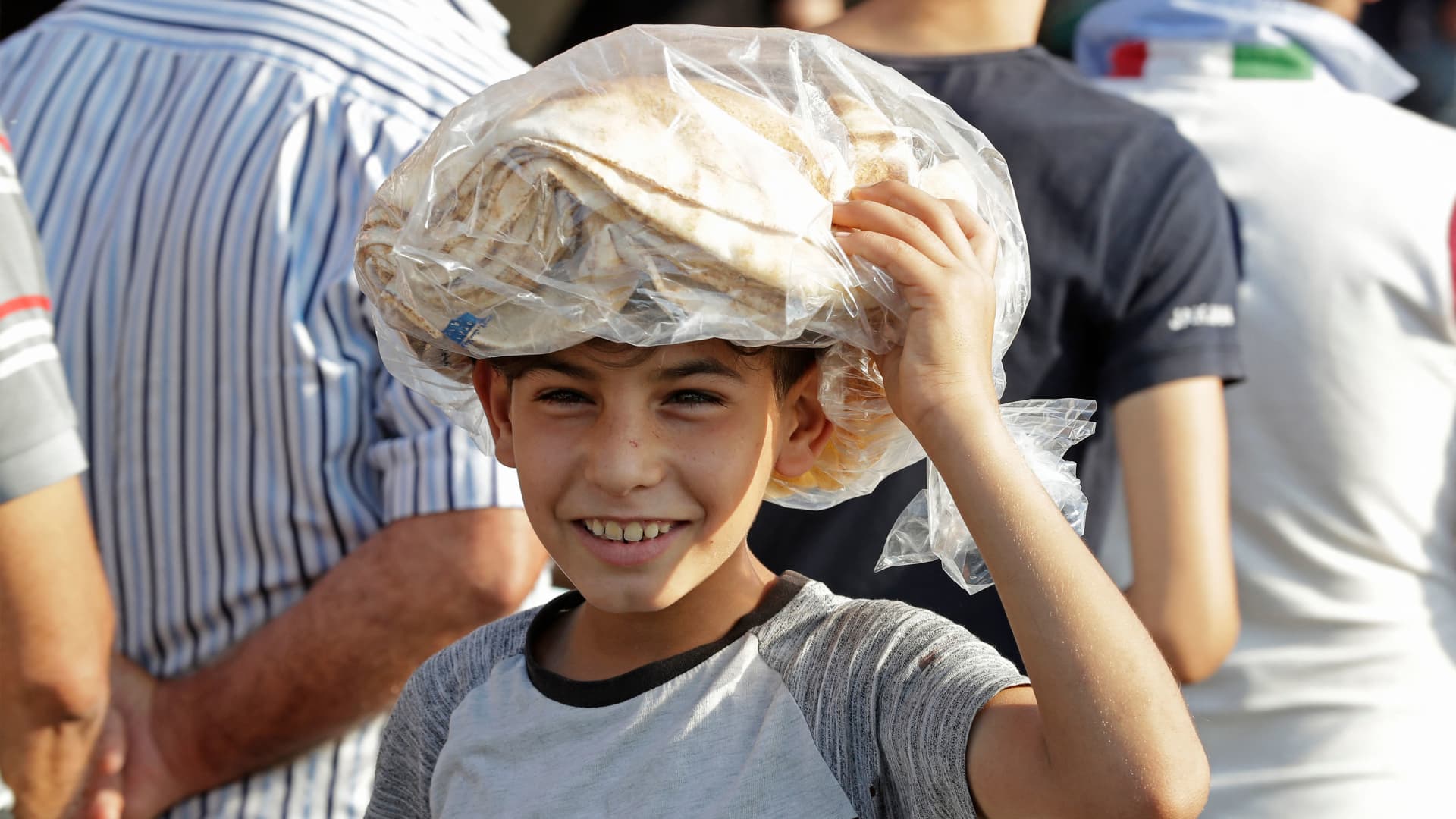
Since the start of the war, the Kremlin’s blockade on Ukrainian grain exports via the Black Sea has sent bread prices skyrocketing.
Mahmoud Zayyat | Afp | Getty Images
With Lebanon already facing its biggest economic crisis ever, the impact of Russia’s war in Ukraine has exacerbated dire living conditions for the Mediterranean nation of nearly 7 million.
Lebanon imports most of its food and all of its fuel, and over 80% of the country’s wheat comes from Ukraine and Russia.
Since the start of the war, the Kremlin’s blockade on Ukrainian grain exports via the Black Sea has sent bread prices skyrocketing. Last week, the two sides signed an agreement, backed by the U.N., aiming to restart grain exports in the region.
However, Russia’s attack on Ukraine’s port city of Odesa, less than 24 hours after the agreement was signed, has thrown the deal’s legitimacy into question, and sent wheat prices higher. If the deal is successfully executed, crucial grain exports will transit through a sea corridor in the Black Sea, potentially providing relief from a growing food crisis across the globe.
The Lebanon Crisis Analytics Team at Mercy Corps told CNBC Monday that the price of wheat flour has risen 209% since the start of Russia’s onslaught in Ukraine, and 330% since the 2019 economic crisis began.
Food and beverage inflation on an annual basis surged to 332% in June, and the wider inflation figure rose to 210% in the same month, according to government data.
Lebanon’s Minister of Economy and Trade, Amin Salam, told CNBC’s Hadley Gamble “we realized that there was a threat way before we got to the Russia-Ukraine crisis, we knew that the country should have had another set of silos around the country to make sure if something happens, we don’t lose our reserves.”
Lebanon’s wheat silos were destroyed in Beirut’s port explosion two years ago, depleting crucial backup supply.
Lebanon’s caretaker government is now desperately trying to secure sources of wheat, Salam told CNBC, including talking directly to the Russians.
“I know that the government, through the Minister of Foreign Affairs have had several discussions about supporting Lebanon and opening up some of the shipment lines that are blocked, because we are having a hard time really receiving shipments that used to take 10 days, now they take three weeks.”
Salam said his government has “not received any positive feedback” from these discussions.
World Bank lifeline
The World Bank in May awarded Lebanon with a $150 million loan, which the Parliament approved on Tuesday. The loan “aims to finance immediate wheat imports to avoid the disruption in supply over the short term and help secure affordable bread for poor and vulnerable households including displaced population and refugees in Lebanon,” the World Bank told CNBC via email.
“The project will also help strengthen the governance capacity in the wheat sector and help put the agriculture and food production system on a pathway toward recovery and greater resilience.”
Salam says the World Bank loan will last between six to nine months, depending on the global price of wheat.
“So far the price has been going down,” Salam told CNBC. “The estimate is that this loan will serve the country for about eight months of supplies.”
Salam added that his hope is that in eight months, the situation in Lebanon will have improved, and perhaps the government will have received a $3 billion loan from the International Monetary Fund too — a long-promised package of support that has yet to be approved.
The IMF loan is conditional on political and fiscal reforms, most of which the government has yet to make.
“We had no other option than to seek help from the international community. The World Bank was very responsive, very fast,” Salam said.
Salam told CNBC the discussions took around 25 days, and the loan “was the fastest and the first granted to any country globally that is related to food security from the World Bank.”
According to the World Bank, Lebanon’s economic collapse is one of the “top 10 severe crises globally since the 19th century.”
Lebanon has also been classified, once again, as a lower middle-income economy by the World Bank. It is Beirut’s first fall in such classifications since 1998.
According to the World Food Programme, “22 percent of households in Lebanon are food insecure,” and the number of “Syrian refugees who are severely or moderately food insecure stands at 1.3 million, of whom 1 million are receiving assistance.”
